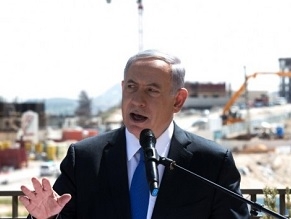|
World Jewish News

Prime Minister Benjamin Netanyahu gives a statement to the press during his visit in Har Homa, on March 16, 2015. (photo credit: AFP PHOTO / MENAHEM KAHANA)
|
Netanyahu: No Palestinian state on my watch
16.03.2015 Prime Minister Benjamin Netanyahu on Monday said a Palestinian state would not be established on his watch, should he be reelected, in part because he warned that any areas that came under Palestinian rule would subsequently become a Hamas stronghold.
During a campaign stop in the East Jerusalem neighborhood of Har Homa, Netanyahu promised to increase construction there, saying it was “a way of stopping Bethlehem from moving toward Jerusalem.”
The prime minister warned in an interview with the NRG news website Monday that a Zionist Union-led government would push for relinquishing territory, a move he said was tantamount to “burying its head in the sand.”
“I think that anyone who moves to establish a Palestinian state today, and evacuate areas, is giving radical Islam an area from which to attack the State of Israel,” Netanyahu said. “This is the true reality that has been created in past years. Those that ignore it are burying their heads in the sand. The left does this, buries its head in the sand, time and again.”
Asked directly whether no Palestinian state would be created under his leadership, the prime minister answered: “Indeed.”
Netanyahu criticized peace talks in 1999 under then-prime minister Ehud Barak, who announced his endorsement of the Zionist Union party on Monday. Barak was “willing to give everything away,” he said.
“As it happened, with God’s help, [then-PA leader Yasser] Arafat’s heart was hardened and he wanted more than was offered,” Netanyahu said, in an allusion to the biblical Pharaoh, whose refusal to set the enslaved Hebrews free brought about his own demise.
The interview appeared to repudiate the prime minister’s speech at Bar-Ilan University in 2009, in which he expressed willingness to negotiate toward the creation of a Palestinian state. At the time, he said that “if we receive a guarantee for security arrangements needed for Israel and if the Palestinians recognize Israel as the home of the Jewish people, we will be willing in a future peace deal to reach a solution of a demilitarized Palestinian state side by side with the Jewish state.”
Netanyahu said Monday that after the election, Israel will face international pressure to pull back to the 1967 lines. “We must establish a strong national government headed by Likud in order to fend off these pressures.”
He said he was “the last line of defense,” and maintained that the Zionist Union understood as much. “We faced tremendous pressures and we will continue to work,” he said.
Earlier this month, the Likud party claimed Netanyahu considered Palestinian statehood irrelevant, a statement the prime minister later retracted as false.
The prime minister also criticized the Zionist Union’s No. 2, Tzipi Livni, for meeting with PA President Mahmoud Abbas against his instructions during the 2014 peace talks. He said that then-finance minister Yair Lapid blocked his plan to move an IDF base in central Israel to the Negev and build thousands of apartments there in an effort to combat the housing crisis, and maintained that he was forced into Tuesday’s election because of Lapid and Livni’s opposition to his policies.
In his speech on Monday, Netanyahu warned that the Zionist Union would give up the area to make way for a Palestinian capital.
“If Tzipi [Livni] and Boujie [Herzog] set up the next government, Hamastan 2 will be established on these hills here,” he said, pointing to the surrounding landscape.
“Hamastan” is a term used by some Israeli politicians to refer to the Gaza Strip, which has been ruled by the Hamas terror group since 2007, two years after Israel pulled out of the territory.
“We are preventing it (by) developing upscale neighborhoods here for tens of thousands of Israelis,” he said. “They will give in… and the meaning of this is that we won’t be able to preserve Israel’s security, and the terror that worked against us before will fire missiles at us from these hills.”
According to The New York Times, Netanyahu said the construction there was “a way of stopping Bethlehem from moving toward Jerusalem.”
“This neighborhood, precisely because it stops the continuation of the Palestinians,” he said. “I saw the potential was really great.”
The prime minister vowed to increase construction in East Jerusalem, and said the city would never be divided.
“We will continue to build in Jerusalem, we will add thousands of housing units, and in the face of all the (international) pressure, we will persist and continue to develop our eternal capital,” he said.
The Times of Israel
|
|
